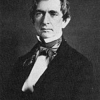William H. Seward

William H. Seward
William Henry Sewardwas United States Secretary of State from 1861 to 1869, and earlier served as Governor of New York and United States Senator. A determined opponent of the spread of slavery in the years leading up to the American Civil War, he was a dominant figure in the Republican Party in its formative years. Although regarded as the leading contender for the party's presidential nomination in 1860, he was defeated by Abraham Lincoln...
NationalityAmerican
ProfessionStatesman
Date of Birth16 May 1801
CountryUnited States of America
There is a higher law than the Constitution.
The whole hope of human progress is suspended on the ever-growing influence of the Bible.
I speak on due consideration because Britain, France, and Mexico, have abolished slavery, and all other European states are preparing to abolish it as speedily as they can.
There is not only no free state which would now establish it, but there is no slave state, which, if it had had the free alternative as we now have, would have founded slavery.
It is the maintenance of slavery by law in a state, not parallels of latitude, that makes its a southern state; and the absence of this, that makes it a northern state.
I have learned, by some experience, that virtue and patriotism, vice and selfishness, are found in all parties, and that they differ less in their motives than in the policies they pursue.
The circumstances of the world are so variable that an irrevocable purpose or opinion is almost synonymous with a foolish one.
It is an irrepressible conflict between opposing and enduring forces.
But assuming the same premises, to wit, that all men are equal by the law of nature and of nations, the right of property in slaves falls to the ground; for one who is equal to another cannot be the owner or property of that other.
But I deny that the Constitution recognizes property in man.
The right to have a slave implies the right in some one to make the slave; that right must be equal and mutual, and this would resolve society into a state of perpetual war.
The proposition of an established classification of states as slave states and free states, as insisted on by some, and into northern and southern, as maintained by others, seems to me purely imaginary, and of course the supposed equilibrium of those classes a mere conceit.
Simultaneously with the establishment of the Constitution, Virginia ceded to the United States her domain, which then extended to the Mississippi, and was even claimed to extend to the Pacific Ocean.
I mean to say that Congress can hereafter decide whether any states, slave or free, can be framed out of Texas. If they should never be framed out of Texas, they never could be admitted.